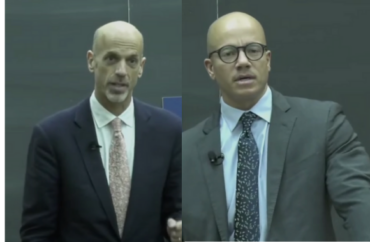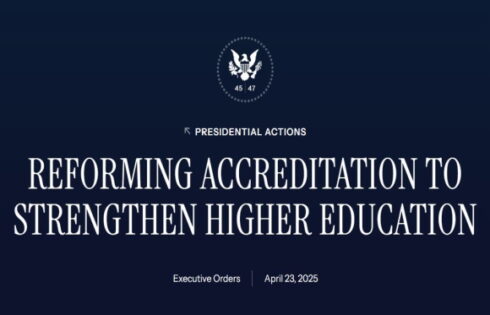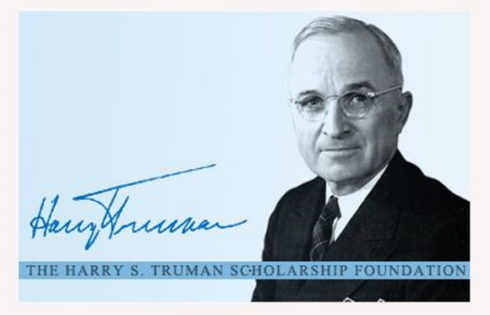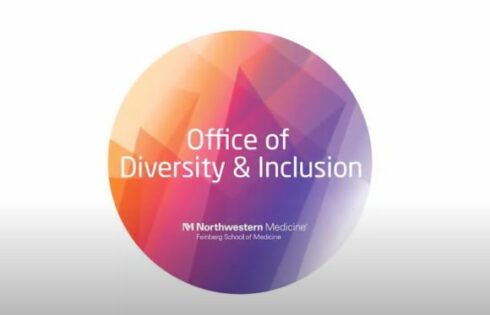
NEW HAVEN, Conn. – The Buckley Institute hosted a “firing line” debate on Tuesday afternoon on the role of “merit” in college admissions as well as hiring.
Devon Westhill, president and general counsel of the Center for Equal Protection, argued in favor of merit, while Yale Law School Professor Daniel Markovits took the more critical approach.
“Is merit a valid measure?” the debate asked, or has it outlived its usefulness.
Westhill (pictured, right) opened by emphasizing the importance of such debates in spaces like Yale, which he argued often lack intellectual diversity, functioning as echo chambers for progressive thought. Honest discussions on the value of merit, he said, benefit both the intellectual majority and minority.
Arguing in favor of meritocracy, Westhill said merit rewards individual achievements, incentivizes hard work, and cultivates excellence.
He said merit-based systems promote social mobility by providing opportunities to those who earn them, rather than those with privileged backgrounds. Westhill, referencing his own experience, said such systems allow individuals to rise above their circumstances.
While acknowledging the intentions behind affirmative action, Westhill criticized it for diluting standards by prioritizing characteristics like race over qualifications. “We must address historical disadvantages,” he said. “But not at the expense of merit. Our goal should be creating an environment where everyone can showcase their abilities and be judged accordingly.”
Markovits (pictured, left) began his response by agreeing on the lack of intellectual diversity in universities, though he argued the issue was broader than a conservative-progressive divide. “There’s not enough diversity among us, intellectually,” Markovits said.
He suggested “global left” perspectives are also missing from academic spaces dominated by U.S. center-left ideologies. While agreeing there are not enough conservative voices, Markovits also said there are too few “Marxists,” “liberation theologists,” and “radical anti-colonialists.”
Turning to meritocracy, Markovits argued that its historical success in dismantling aristocratic privilege has been overshadowed by its current flaws. He said today’s meritocratic elite perpetuate their status through intergenerational advantages, such as vastly unequal investments in education.
This, he said, has contributed to widening socioeconomic gaps. “Meritocracy was once an engine of opportunity,” Markovits said, “but now it is the single biggest obstacle to equality.”
Markovits further argued that meritocracy fosters moral harm by cloaking systemic inequality in the language of deservedness.
This rhetoric, he said, leaves the disadvantaged morally exposed, fostering anger that manifests as populism and internalized harm, such as the opioid crisis. “Meritocracy tells the disadvantaged, ‘You’re not good enough,’ creating profound human costs,” he said.
Challenging the reliance on test scores and grades, Markovits questioned their validity as holistic measures of merit. “What we pursue as merit,” he concluded, “is at best nonsense and probably a lie.”
In his rebuttal, Westhill said Markovits’ critique was not of meritocracy itself but of the narrow ways in which merit is defined and applied. He argued that test scores and grades are only part of a broader, more holistic understanding of merit. “Merit includes recognizing an individual’s full set of qualifications and potential,” he said.
Markovits pressed the question: if not test scores and grades, what defines merit?
He challenged the audience to consider what kind of contributions society values most, contrasting a high-earning banker with a nurse earning far less despite arguably greater social value.
He proposed moving beyond the zero-sum competition of traditional meritocracy to focus on cultivating excellence. Universities and employers, he argued, should prioritize identifying the skills needed for meaningful work rather than perpetuating rigid hierarchies.
Markovits also called for an expansion of opportunities. He criticized the narrowness of elite university admissions, noting that the best schools have barely increased their capacity in a century.
Admissions committees, he said, act as “unelected social planners” determining societal outcomes.
Instead, he proposed expanding elite institutions’ enrollment and recruiting from untapped talent pools, such as community colleges, to make opportunities more accessible. From there, he suggested admissions could function as a lottery for qualified candidates.
“We’re asking how to make a narrow elite,” Markovits concluded, “when we should be asking how to educate the country.”
During the question-and-answer session, a student asked how ideological diversity could be achieved in academia. Westhill supported the idea of “affirmative action for conservatives,” suggesting that universities intentionally recruit conservative students and academics to enrich the intellectual landscape.
He cautioned, however, against excessive political interference in higher education.
Markovits responded by questioning the appropriate distribution of ideas in academia and if universities should reflect the ideological makeup of their host countries or the global marketplace of ideas.
He said the answer might differ by department, with a philosophy department requiring a broader range of perspectives than, for example, a business school.
He ended with a call for more diverse representation across the ideological spectrum, including conservatives with strong religious convictions, progressives focused on workers’ rights, and those outside the American political binary.
MORE: Ohio State U. prioritized DEI over merit, documents show
IMAGE: Buckley Institute/YouTube
Like The College Fix on Facebook / Follow us on Twitter






Please join the conversation about our stories on Facebook, Twitter, Instagram, Reddit, MeWe, Rumble, Gab, Minds and Gettr.